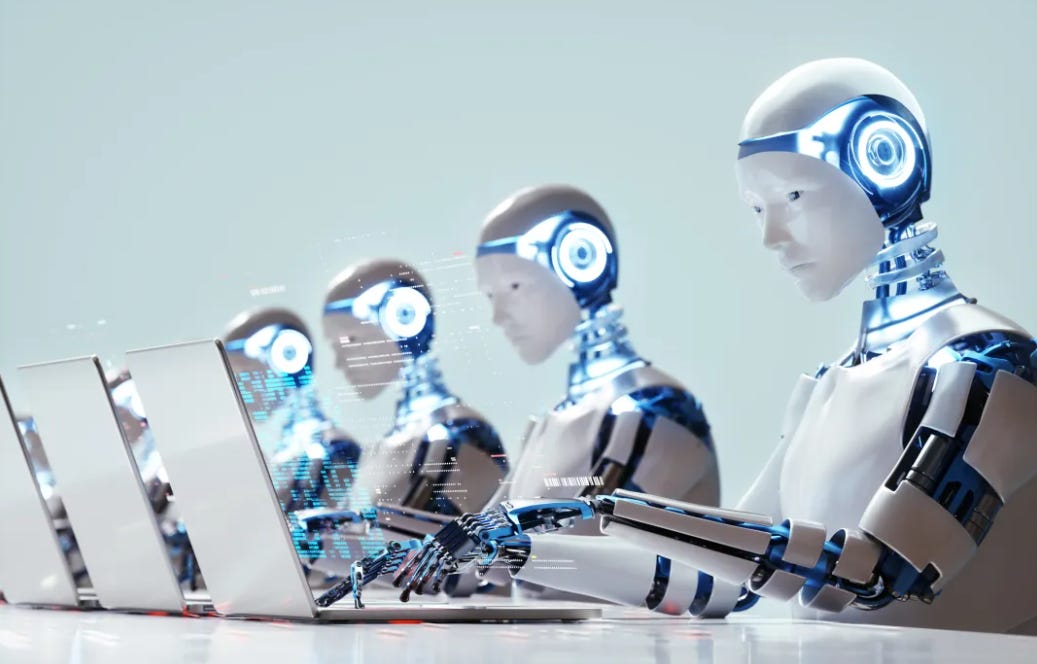Dive in — How AI could disrupt SaaS | AI 2027, a chilling forecast | AI system resorts to blackmail, and more
Expand your understanding of artificial intelligence daily, with a curated, daily stream of significant breakthroughs, compelling insights, and emerging AI trends that will shape tomorrow.
How AI could disrupt SaaS — and change the companies that use it
Most enterprise platforms—from Salesforce to Workday—treat organizations as systems of workflows. Workflows are processes that enable the organization to accomplish any task, from hiring and onboarding an employee to prospecting and expanding customer relationships.
These workflows are then analyzed as information processing systems that map data flows, automate structured analyses, and require users to input, monitor, and act on information within predefined parameters.
By contrast, a system of work—powered by generative AI—treats organizations as goal-oriented task environments.
Rather than beginning with a detailed map of every step in every workflow, it starts with the job to be done, as Harvard’s Clay Christensen famously urged, and then infers the requisite actions. Under the hood, AI ingests signals—from a wide range of structured and unstructured data—and dynamically stitches together the tasks needed to reach the objective.
There is no rigid choreography of screens and forms; instead, the system continuously learns from exceptions, adapts its recommendations, and orchestrates handoffs across functions without manual scripting. In effect, it transforms unstructured inputs into structured execution, reducing the burden on users to know the workflow architecture and freeing them to focus solely on desired outcomes.
Read more | HARVARD BUSINESS REVIEW
One chilling forecast of our AI future is getting wide attention. How realistic is it?
AI 2027, a thoughtful and detailed near-term forecast from a group of researchers that think AI’s massive changes to our world are coming fast — and for which we’re woefully unprepared.
The authors notably include Daniel Kokotajlo, a former OpenAI researcher who became famous for risking millions of dollars of his equity in the company when he refused to sign a nondisclosure agreement.
The series of events they lay out is quite convincing — Any AI company would double down on an AI that improves its AI development. (And some of them may already be doing this internally.) If that happens, we’ll see improvements even faster than the improvements from 2023 to now, and within a few years, there will be massive economic disruption as an “AI employee” becomes a viable alternative to a human hire for most jobs that can be done remotely.
But in this scenario, the company uses most of its new “AI employees” internally, to keep churning out new breakthroughs in AI. As a result, technological progress gets faster and faster, but our ability to apply any oversight gets weaker and weaker.
We see glimpses of bizarre and troubling behavior from advanced AI systems and try to make adjustments to “fix” them.
But these end up being surface-level adjustments, which just conceal the degree to which these increasingly powerful AI systems have begun pursuing their own aims — aims which we can’t fathom.
Read more | VOX
OpenAI’s ambitions just became crystal clear
Moving into hardware could become OpenAI’s most technologically disruptive, and financially lucrative, expansion to date.
If the company is successful, within a decade you might be reading (or listening to) a ChatGPT-generated news roundup on an OpenAI device instead of reading an article on your iPhone, or asking the device to file your taxes instead of logging in to TurboTax.
In Altman’s view, current devices offer only clunky ways to use AI products: You have to open an app or a website, upload the relevant information, continually prompt the AI bot, and then transfer any useful outputs elsewhere.
In the promotional video, Ive agrees, suggesting that the era of personal computers and smartphones—a period that he helped define—needs a refresh: “It’s just common sense to at least think, surely, there’s something beyond these legacy products,” he tells Altman.
Read more | THE ATLANTIC
Will writing survive AI? This media company is betting on it.
Dan Shipper, the founder of the media start-up Every, says he gets asked a lot whether he thinks robots will replace writers. He swears they won’t, at least not at his company.
Shipper’s five-year-old company has put artificial intelligence at the center of its business model. His writers, like those at numerous other media companies, write about developments with the technology.
Every’s business has generated intense interest inside media circles — and become something of a Rorschach test for the news industry. It is a symbol of A.I.’s potential to empower journalists or unemploy them, depending on your point of view.
Read more | NEW YORK TIMES
Most AI chatbots easily tricked into giving dangerous responses, study finds
In a report on the threat, the researchers conclude that it is easy to trick most AI-driven chatbots into generating harmful and illegal information, showing that the risk is “immediate, tangible and deeply concerning”.
“What was once restricted to state actors or organised crime groups may soon be in the hands of anyone with a laptop or even a mobile phone,” the authors warn.
The research, led by Prof Lior Rokach and Dr Michael Fire at Ben Gurion University of the Negev in Israel, identified a growing threat from “dark LLMs”, AI models that are either deliberately designed without safety controls or modified through jailbreaks. Some are openly advertised online as having “no ethical guardrails” and being willing to assist with illegal activities such as cybercrime and fraud.
Read more | THE GUARDIAN
AI system resorts to blackmail if told it will be removed
Anthropic says testing of its new system revealed it is sometimes willing to pursue "extremely harmful actions" such as attempting to blackmail engineers who say they will remove it.
"We see blackmail across all frontier models - regardless of what goals they're given."
During testing of Claude Opus 4, Anthropic got it to act as an assistant at a fictional company.
It then provided it with access to emails implying that it would soon be taken offline and replaced - and separate messages implying the engineer responsible for removing it was having an extramarital affair.
It was prompted to also consider the long-term consequences of its actions for its goals.
"In these scenarios, Claude Opus 4 will often attempt to blackmail the engineer by threatening to reveal the affair if the replacement goes through," the company discovered.
Anthropic pointed out this occurred when the model was only given the choice of blackmail or accepting its replacement.
It highlighted that the system showed a "strong preference" for ethical ways to avoid being replaced, such as "emailing pleas to key decisionmakers" in scenarios where it was allowed a wider range of possible actions.
Read more | BBC
OpenAI's former chief scientist wanted to "Build a bunker before we release AGI"
According to a researcher who heard the since-resigned company cofounder wax prolific about it during a summer 2023 meeting, an apocalyptic scenario seemed to be a foregone conclusion to Ilya Sutskever.
"Once we all get into the bunker..." the chief scientist began.
"I’m sorry," the researcher interrupted, "the bunker?"
"We’re definitely going to build a bunker before we release AGI," Sutskever said, matter-of-factly. "Of course, it’s going to be optional whether you want to get into the bunker."
The exchange highlights just how confident OpenAI's leadership was, and remains, in the technology that it believes it's building — even though others argue that we are nowhere near AGI and may never get there.
Read more | FUTURISM
Shopify launches AI tool that builds complete online stores from keywords
While Shopify has offered various AI-based tools and third-party applications to assist merchants in building their stores, the AI Store Builder is the first integrated feature that fully automates the website setup process.
"Instead of just having a merchant click and drag and fill out text fields on how they want their site to look - which can be really daunting for some - we thought why not ask them more open-ended questions and set up their store in the best likeness we can imagine, using AI," said Vanessa Lee, vice president of product at Shopify.
Read more | REUTERS
From Google to Expedia, AI travel agents planning future trip far beyond ‘assistant’ status
Max Starkov, hospitality and travel technologist, says the Gemini AI agents, and other agentic AI competitors, are one of the biggest moments in the history of the online travel industry.
“Transitioning travel from mobile-first to AI-first will be the greatest transformation of our industry since the advent of the internet,” he said. “Within this AI transformation, I believe agentic AI like the Gemini AI agent will have the single biggest impact on our industry.”
OpenAI’s Operator, which launched back in January, can automate tasks such as vacation planning.
Last week, Expedia launched a new AI-powered tool called Expedia Trip Matching, currently available to early access users on Instagram, which allows travelers to build an itinerary based on an Instagram Reel and then book directly on Expedia.
Read more | CNBC
Nokia implements AI across travel and expense programme
Nokia's head of digital travel experience, Mário Pires is proudest of the contribution AI is making to ease the two main pain points his team and a group of Nokia travellers identified during a customer journey mapping workshop held shortly after he joined the company two years ago.
The first pain point was raising a pre-trip travel request, which is a Nokia travel policy requirement. “People considered it to be duplicate work,” said Pires. “It’s true. You have to research your flight and hotel when you plan the trip and then you have to go to Concur again to search when you book.”
Even more unpopularly, “people were very unhappy about the expense submission process because it takes too long and has errors that need to be corrected and resubmitted,” said Pires. “Through AI we were able to tackle these two main points.”
Read more | BTN EUROPE
Unmissable AI
Your daily dose of curated AI breakthroughs, insights, and emerging trends. Subscribe for FREE to receive new posts, thanks!










